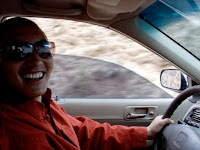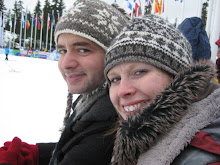
The day after arriving in Yushu we visited the Princess Wencheng Temple, one of the noteworthy sites of the area. Princess Wencheng was a famous Tang dynasty princess who was married to a Tibetan king named Songtsan Gambo (the enormous statue in Yushu was probably him, though I'm not certain) and thereby helped bridge the gap between the two cultures. The temple in Yushu is to commemorate her passing through the area, and apparently there are two Tibetan festivals to honor her.
On the bus to the temple we had an unexpected surprise: our fellow passengers were none other than the same migrant workers who had been kicked off the bus on the way to Yushu and presumed lost to the elements and wild dogs. They also got a kick out of seeing us again and we (rather, Andrew) had a friendly chat with them. We also slowly pieced together the story: there is a rare plant grown in the area (called 冬虫夏草 dōng chóng xià cǎo) that is used by upper crust Chinese as an aphrodisiac, and therefore sells for a high price. There is money to be made harvesting the plant, which is not easy to do, and there is a law preventing outsiders from coming in and profiting off it. Thus a permit is required to get in. That, or take an expensive taxi and sneak into town after you've been kicked off the bus after 14 hours, like those guys did. They were in fact not sightseeing at the Princess Wencheng Temple, but rather heading farther on to a place where there was work. They had also reunited with their super-shady baseball cap-donning boss.
 The temple was certainly a pleasant, atmospheric place, quieter and more enjoyable than the more famous Ta'er Si outside of Xining. The cliff sides towering over the building were bursting with colorful prayer flags, and the surrounding scenery was not half bad. The monks living and studying in the temple were a friendly and curious group. I guess it shouldn't be surprising but in general the monks we met on the trip were memorably hospitable and kind. There was only one monk who could speak good Chinese at the temple, and at around 24 was the oldest. After a number of years of studying Buddhism the monks would graduate and move on. They were not allowed to marry, and if they did they would have to permanently leave the order.
The temple was certainly a pleasant, atmospheric place, quieter and more enjoyable than the more famous Ta'er Si outside of Xining. The cliff sides towering over the building were bursting with colorful prayer flags, and the surrounding scenery was not half bad. The monks living and studying in the temple were a friendly and curious group. I guess it shouldn't be surprising but in general the monks we met on the trip were memorably hospitable and kind. There was only one monk who could speak good Chinese at the temple, and at around 24 was the oldest. After a number of years of studying Buddhism the monks would graduate and move on. They were not allowed to marry, and if they did they would have to permanently leave the order. After touring the modest temple we took a walk out into the surrounding countryside. The shy girl running a small store told us there was a primary school about a half-hour walk along the path, and we figured we'd see what was to be seen while we waited for the bus to return in the later afternoon. We did find the school, which was a poor, one-room schoolhouse with just one class of 50 students. The students were at different ages and levels, averaging around 8 or 9 years old, and there were only two teachers. The children poured out of the building after their lesson and took some long, curious looks at us, with a few of the braver ones coming up to say "hello". As with most of the area, they were all Tibetan.
After touring the modest temple we took a walk out into the surrounding countryside. The shy girl running a small store told us there was a primary school about a half-hour walk along the path, and we figured we'd see what was to be seen while we waited for the bus to return in the later afternoon. We did find the school, which was a poor, one-room schoolhouse with just one class of 50 students. The students were at different ages and levels, averaging around 8 or 9 years old, and there were only two teachers. The children poured out of the building after their lesson and took some long, curious looks at us, with a few of the braver ones coming up to say "hello". As with most of the area, they were all Tibetan. When we returned to the temple to wait for the bus, a monk who was driving into town offered us a ride in his car, which we gladly accepted. He went out of his way to show us a nearby cliff carving of a Buddha, and was quite a cool monk. He was very fond of Stephen's sunglasses which he was borrowing, and seemed to be dropping hints that he wouldn't mind if Stephen gave them to him, but Stephen hadn't brought them all the way from America just to make a monk in Qinghai stylish. The music selection of the day was Buddhist chanting. When he dropped us at our hotel we decided to give him some gas money as thanks. As it happened there was a 20 yuan bill laying on the ground just in front of us. We weren't quite sure where it came from, possibly falling out of one of our pockets, but we gave it to the monk, who declared "money from Heaven!"
When we returned to the temple to wait for the bus, a monk who was driving into town offered us a ride in his car, which we gladly accepted. He went out of his way to show us a nearby cliff carving of a Buddha, and was quite a cool monk. He was very fond of Stephen's sunglasses which he was borrowing, and seemed to be dropping hints that he wouldn't mind if Stephen gave them to him, but Stephen hadn't brought them all the way from America just to make a monk in Qinghai stylish. The music selection of the day was Buddhist chanting. When he dropped us at our hotel we decided to give him some gas money as thanks. As it happened there was a 20 yuan bill laying on the ground just in front of us. We weren't quite sure where it came from, possibly falling out of one of our pockets, but we gave it to the monk, who declared "money from Heaven!" That afternoon we went to the bus station to buy return tickets, and met one of the more colorful characters of the trip, a middle-aged Tibetan man whose English name was Jerry. Jerry dabbled in officialdom, selling pet food, history, amateur philosophizing, and heavy drinking. If he spoke English I think he would have used phrases like "now let me tell you something" a lot. He spoke quite fast and excitedly so mostly the only one who could keep up with his Chinese was Andrew, who Jerry was fond of hitting with the back of his hand when making an important point, at least once spraying the ashes of his cigarette all over Andrew's clothes. He was straight out of the movies, especially in his all-black outfit and sunglasses, and Stephen eventually caught on to his resemblance to Al Pacino.
That afternoon we went to the bus station to buy return tickets, and met one of the more colorful characters of the trip, a middle-aged Tibetan man whose English name was Jerry. Jerry dabbled in officialdom, selling pet food, history, amateur philosophizing, and heavy drinking. If he spoke English I think he would have used phrases like "now let me tell you something" a lot. He spoke quite fast and excitedly so mostly the only one who could keep up with his Chinese was Andrew, who Jerry was fond of hitting with the back of his hand when making an important point, at least once spraying the ashes of his cigarette all over Andrew's clothes. He was straight out of the movies, especially in his all-black outfit and sunglasses, and Stephen eventually caught on to his resemblance to Al Pacino.After a long conversation at the bus station, during which we learned his son was in India studying at the Dalai Llama's school, he decided to show us around town. By "around town", I mean hang out by the river and drink beer and baijiu (Chinese liquor). We were to have company: four Tibetan woman in their late 20's or early 30's, sitting on the rocks and singing to their hearts' contents. They were also wasted. Sadly, only one of them had learned to speak Tibetan, the other three knowing only Chinese. The three of us drank lazily but Jerry hit the baijiu at a brisk pace. The more he drank the more he talked (not that anything had been stopping him), and at one point he went into an amusing string of stories about war, which he acted out as he told them. He was actually a pretty intelligent guy, who had a lot of political opinions and made comments commending the US style of agriculture. 95% of our Chinese conversations are based on "can you use chopsticks?" and "are you used to the food here?" He was also sentimental about Tibet's lack of independence, and told Andrew he identified with Scotland. A young monk also joined us for a little while, and among other things we learned that the 4 big sins for his religion are killing, stealing, drinking, and sex.
When we left the river it was getting on in the evening and we had discussed getting dinner together, but by this point Jerry was drunk and increasingly annoying. We decided to part ways, but subtle hints were not working and he continued to follow us towards our hotel and into our room, jabbering the entire time. Though Andrew was by far the best able to speak to him he was also by far the most polite. He did get it across that we wanted to rest and be alone, and though Jerry agreed in words, he wouldn't follow through in action. He had been in war mode for the past couple of hours, asking me questions like "do you think I'm more of a scholar or a warrior?" Once drunk he had taken a liking to me, describing me as a leader, which I can only attribute to my superior beard-growing skills. Which reminds me: on the first day of the trip the three of us decided that none of us would shave, and thus a beard-growing competition commenced, and may the manliest among us win.
When we left the hotel we was still with us, so we had to resort to drastic measures. We had the advantage of him not understanding our native language, and organized a quick plan. Stephen called Andrew's cell phone, and Andrew answered and pretended to be making plans with a friend. He then explained we had to be at our friend's house for dinner, and really had to be going. Jerry said he would leave, yet refused to do so, talking all the while. Finally I reached the end of my patience and flagged down a taxi, and thankfully he didn't get in with us and we were rid of him. Al Pacino had been given the slip.



No comments:
Post a Comment